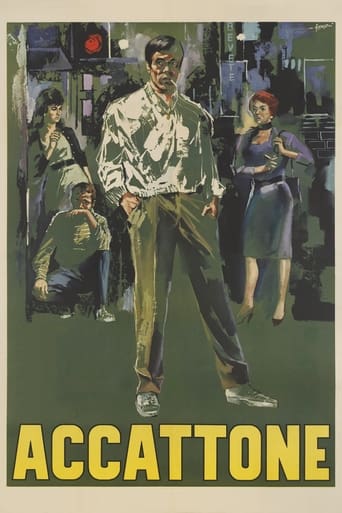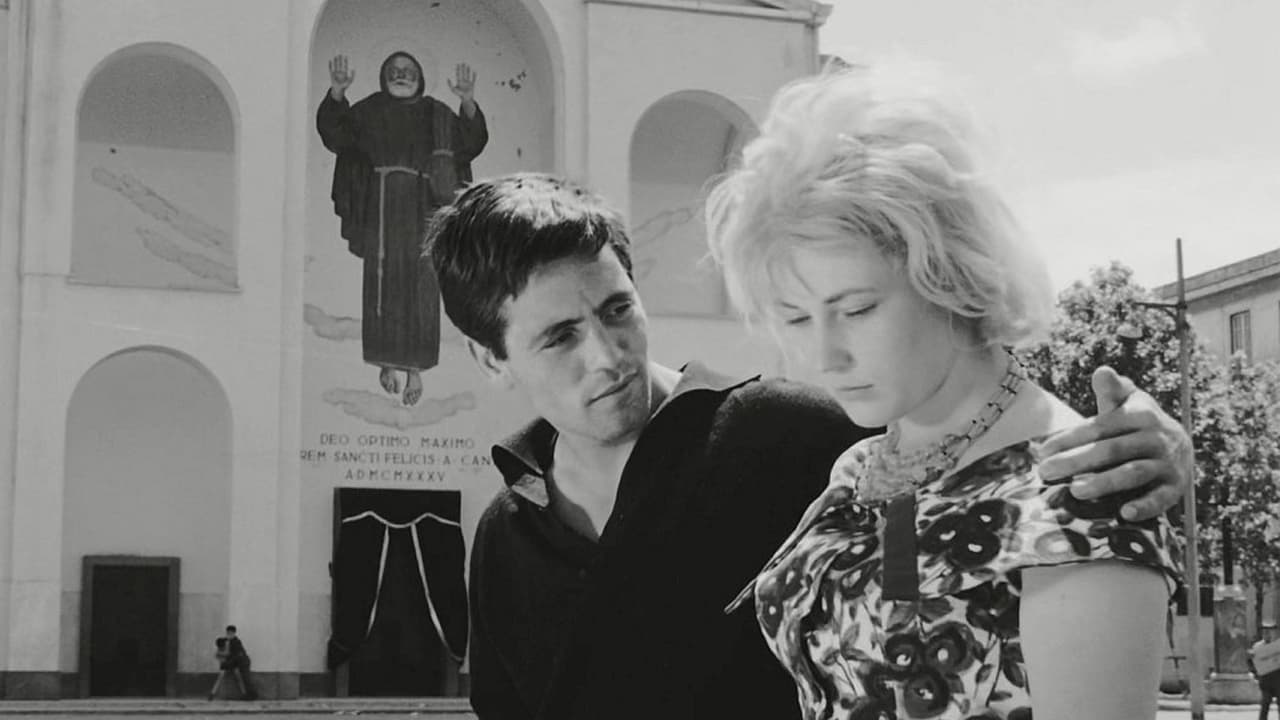michaelgfalk
This is not the Rome you see on Contiki. Pasolini has conjured up the half-life of the streets in this extraordinary movie. Accatone is a pimp and an idler, his friends are no better, and they walk Rome's emptiest streets night and day doing nothing much at all. Pasolini captures their aimless existence with his artless cinematography. Most of the dialogue is shot close up, and the cast deliver their lines with character and simplicity. It is perhaps their authenticity that makes them charming. Even Accatone is charming, despite his selfishness, idleness, resentment and occasional misogyny. They all need to be charming. In the bleak world of this movie, irony is the only defence against madness. There are moments of happiness that break through, and prevent the film from becoming monotonous or unrealistic. The beach scene near the start, and the later conversations between the tough and self-confident prostitutes, are scenes in which irony breaks out into humour, and defiance momentarily turns to content."The world will kill me, or I'll kill it!" exclaims Accatone. He struggles for redemption— but I won't spoil the end of the movie.
JoeKulik
Pasollini's Accattone (1961) is a film that clearly shows the writer/director was not only uninformed, but even naive about the social situation to which his film related. This film is so detached from the slum life of the big city, and the realities of the life of pimps and prostitutes that it could better be called an example of Un-Realism, than Neo-Realism.This filmmaker couldn't even stage a good street fight, just showing two guys rolling around in the street locked in bear hugs.The protagonist's first prostitute is portrayed getting a broken leg, and is soon shown thereafter walking around with a cast on the leg, yet with no limp, or crutches. Sorry, but having a broken leg doesn't work that way.This first prostitute is shown getting badly beaten, yet then is shown in the police station without a bruise on her. Now that Neo-Un-Realism, if I ever saw it.That the protagonist is shown almost starving after his only hooker is jailed is just STUPID. Pimps are street savvy guys who have more than one girl in their stable, and are street smart enough to make money in a variety of ways besides pimping.I could go on and on, but what's the point? The costumes, the characters, and dialogue is nothing close to appropriate for the social situation that this film is supposedly portraying. This filmmaker obviously never entered the slums of a big city, and never met real pimps and prostitutes. He was making a supposedly realistic account of a social scene of which he was obviously ignorant.This is the first Pasollini film that I've viewed, and it's his first film that he made. But solely on the basis of viewing his first film, I really don't think that this guy showed enough here to merit a second chance.
MisterWhiplash
Accattone announces a director, Pier Paolo Pasolini, who is a haunting/haunted poet from his surroundings and realist, someone who wants to put his eye on the world without flinching on the details of how 'ordinary' (of the street) people speak and interact, how raw and uninhibited they can be, these being the guys on the streets who are vulgar and coarse at best and at worst are abusers of women. But at the same time what one comes away with is poetry in documentary form - it's another level of neo-realism, a little more like an urban story than a post-war treatise that still throbs with the importance of those in poverty. Anytime I hear the song Matthaus Passion I'll immediately contemplate those harsh images of Vittorio Accattone, being cast aside by his family for being a pimp, or that poor girl being beaten at night by that gang of men, which is something that elevates such hard scenes into art.Vittorio Accattone is the main character- charming and attractive, and also a perpetual scoundrel who also is a total outcast. He has a wife and kid(s), but is estranged from them by choice - her choice most likely - and he finds himself in big trouble once his main prostitute, Maddalena, is sent to prison for a bad informing job. It's after this we see Accatone on his potential path to redemption when he meets a supremely sweet and average girl from out of town, Stella, who he may eye as a new girl on the street... or perhaps not, as his attachment to her grows more and stronger, in spite of what and who are around him every day and night in the dirty province.He's someone we want to root for in being a better person, or, perhaps even, better at what he does. He's a tragic anti-hero in a New-Wave sort of sense, cool looking and aspiring to be modern and cool (and maybe he is, up to a point), but also poor and uneducated, so much so that being on the fringe and being called "PIMP!" is what he's been reduced to by default. The performance from Franco Citti is one thing that keeps the viewer locked in: he's so good here because he looks plucked right off the street by Pasolini, as would turn to be his method with choosing most of his 'actors' on camera. There's a reality to his interactions with his friends (so called) or his business associates. Some of their dialog and tones of speech aren't refined or look trained. At one point when Citti's Vittorio breaks down in tears- a sudden turn from a previous scene showing more attitude- is authentic, even as another actor could have possibly played it "better".It is what Pasolini wants, and he gets it, much in the same way he also gets a view of this side of Rome in a way that hasn't been seen before up until this time. His DP Tonino Delli Colli shoots simply often, and sometimes not so much - there's complexity, say, to a tracking shot in front of Accatone talking to a girl who is on a bicycle, or when we see the horrorshow of the men taking Maddalena at night in the middle of nowhere, the only lights starkly coming from the car. The effect is nothing short of a slow-burn. While a few of the actors do fall a bit too flat, and some scenes come close to lagging around (the editing might be the most significant flaw here), the raw emotion and fire in the subject matter keeps things fascinating. You want to see what happens with this young guy, and it's his tragedy that gets us absorbed, even as the Bach music abstracts the sorrow, and agonizing poetry of the streets, and it's this that makes it a classic.Only downside I must mention - if you live in the US, or happen to watch it on a DVD or online from Walter Bearer films, the print is just not very good. It's the sort where the white subtitles drop in and out of view depending on who's standing where in a frame. It's not totally detrimental, but some scenes become hard to follow due to the poor quality of the subtitles with the print. This, if for no other reason, demands the film receive the Criteron treatment.
nnad
Accatone is an interesting film because Pasolini exposes to his audience a particular lifestyle and social class which would not be accurately touched on in an American picture. If Hollywood had ever discussed Accatone's subject matter they would display it with all its stereotypical adornments and falsities which most US moviegoers are accustomed to. Pasolini is not afraid to present the grittier side of the subproletariat as is epitomized in the film's main character, Accatone, who struggles with his profession of pimping and becoming more sensitive to his women and to the world. Pasolini's debut is delicately permeated with political concepts and allegories, yet we can see that he is experimenting newly with the technique of film and developing a filmic narrative structure; more of his full-fledged sociopolitical allegories would be pursued in films like The Gospel and Hawks and Sparrows. The film stars Franco Citti who at the time of making of the film was a nonprofessional. However his performance is substantial considering him being a novice and having his voice overdubbed by another actor. Citti would soon become a Pasolini regular, starring in Oedipus Rex, Arabian Nights, and other supporting roles. However, as the film progresses the attention is centered on the female lead, who plays the naive soon-to-be callous farm worker who is duped by Accatone into prostitution. Before Pasolini ventured into the cinema he had a knack for writing. In his first two novels Pasolini had utilized the language of his mother's homeland, Friuli, for colloquial discourse amongst his characters who lived in subproletariat communities. It is not surprising that the subject of these novels would be the focal point of Accatone. In addition I believe Pasolini had rendered his ideas (from his literature) appropriately for his film, yet not becoming to carried away with fidelity and technical aspects which are profuse in films today. To this day there are apparently no film directors as consciously aware of his country and government as Pasolini was and that would transcend these beliefs into his art with controversy yet at the same time subtlety.


 AD
AD



